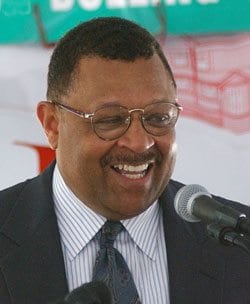
Bruce C. Bolling, a member of a powerful political dynasty in Boston, was the first African American elected president of the Boston City Council. He died early Tuesday morning at his home in Roxbury after a long battle with prostate cancer. He was 67.
“Bruce Bolling was a true advocate for the social justice issues in our city,” said Boston Mayor Thomas Menino Tuesday. “He never stopped working to help small businesses and was especially influential in helping minority and women-owned businesses thrive. My condolences go out to the Bolling family and hope they know the legacy of good work Bruce has left in his passing.”
Always ebullient about political equality, Bolling possessed an uncanny penchant for politics that was hardly equaled by his peers. During a storied political career Bolling had been recognized for his ability to develop and successfully pass laws which would have lasting citywide and cross-racial significance.
Such legislation included the creation of the Boston Resident Jobs Policy, The Fair Housing Commission, The Parcel to Parcel Linkage Law, The Elder Safety Home Law and the Arson Commission. Bolling’s prodigious legislative record often transcended racial categories as he was acknowledged often for the sheer salience and scope of the body of laws he sponsored.
“I can think of no other city councilor who has had such a profound and lasting impact on Boston than Bruce Bolling,” said Councillor Charles C. Yancey, who served with Bolling the longest on the city’s governing body.
“We certainly had a real privilege to have had Bruce here in Boston as a public service,” Yancey said. “He will be sorely missed.”
Long-time legislative chief of staff, Brooke Woodson, lamented Bolling’s passing by reflecting on his leadership style. “He was eloquent. He was the kind of person who led by example. If you watched him closely you could learn a lot from Bruce,” said Woodson who now serves as a senior advisor to Mayor Menino on small businesses.
Other prominent aides mentored by Bolling include Ron Malow, Civil Rights undersecretary to Gov. Deval Patrick, Jerry McDermott, former Boston city councilor and senior political director for U.S. Sen. Scott Brown, Karen Nober, director of the State Ethics Commission and Karen Charles, chief of staff for the state’s Department of Telecommunications and Cable.
Born to former state Senator Royal Bolling Sr. and Thelma, Bolling was raised in Boston, attending Boston English High School, Northeastern University and Cambridge College. He was first elected to the Boston City Council citywide in 1981 after having worked for former Mayor Kevin White. Bolling was one among the famous “Kevin’s Seven” to run for city council in 1981. Bolling was the sole winner on Mayor White’s slate that year.
An early supporter of Rev. Jesse Jackson’s historic run for president, Bolling was an eager promoter of creating “an even playing field” for blacks, Asians and Latinos so that “all could take part in Boston’s prosperity.”
In 1988 he served as the chairman of the Massachusetts Committee for Rev. Jackson.
Deemed by many as a political moderate, Bolling has been characterized as a bridge figure who set a new standard of engagement for African American elected officials within the larger, white-controlled political establishment.
Bolling and his family reached legendary political status in the black community when he, his father and brother, Royal Jr. simultaneously held elected office at the state and city level. Bolling was elected to the city council’s presidency twice in 1986 and 1987.
Dapper and naturally charismatic with an extensive knowledge of legislative procedure, Bolling worked toward compromise and consensus on the council. He campaigned to create a “better Boston” that reflected fairness for the city’s emerging communities.
Bolling served as a racial healer in the aftermath of Boston’s busing crisis in the 1970s. He was instrumental in urging for calm during the Charles Stuart case in which a white man sought to blame the murder of his wife and son on a fictional black man in Roxbury. The case caused a national racial uproar and led to police and community tensions that remain until today.
As a city councilor, Bolling opposed efforts by some radicals in the black community to create a separate city called Mandela which would have led to so-called minority neighborhoods succeeding from Boston based upon perceived racial bias.
Bolling was the sponsor of the city’s groundbreaking Gun Buy Back Program, which was a significant component of the strategy to reduce the skyrocketing gang-violence violence which had plagued Boston in the early 1990s.
In his final act of public lobbying, Bolling testified to the statewide redistricting committee last year where he pushed for more legislative seats to be made available to so-called minorities at the state house. In 1993, Bolling ran for Mayor of Boston.
He leaves his immediate family Joyce Ferriabough-Bolling, a local political and media consultant, and his son, Bruce Jr. Funeral arrangements are pending.






